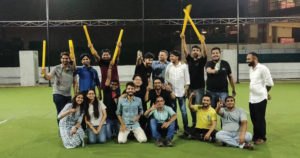SRJNA, an ed-tech company started in Rajasthan, plans to take tinkering labs mainstream by partnering with schools across the country

SRJNA is the brainchild of four IIT-Delhi classmates who realised the gaps in teaching methodology. The team wanted to ease the transition from theoretical learning to practical application of concepts. So, in 2014, they got together to design an interactive lab experience for school kids.
Taking the B2B approach of catering to schools, they offer two products- Innovation Labs (maths and science) and Tinkering labs (technology and engineering). The team partnered with Tinkering Labs, USA and was funded by the Indian government to set up Atal Tinkering Labs.
They offer kits that demonstrate robotics, 3D printing, mechanical and electrical tools. The other offering, Innovation labs, provides training to school teachers, a mobile app, equipments and student assessment sheets.
In December 2017, the company hit Rs. 2 crore in turnover from 45 schools. Currently they are present in 100 schools in 15 states. “The goal is to reach 500 schools in the next couples of years,” says Sharad Bansal, CEO. Their products are priced between Rs. 3.4 lakh to Rs. 6 lakh per year depending on the needs of particular school. They are working to raise their renewal rate in schools which they claim is 80 per cent to 85 per cent currently.
“We are currently revenue-funded after turning profitable late last year,” says Bansal. They are hoping to raise a round of funds in the coming months, three years after their first funding in September 2015 for US $65,000. Their initial investors were part of TiE Rajasthan. In July this year, SRJNA received Rajasthan government’s Bhamashah Techno Fund of Rs, 20 lakh.
“While funding was a source of concern until recently, it is no longer the most pressing issue after turning profitable,” he says. Their biggest challenge now is to reach out to clients directly without being dependent on the government when it comes to their Tinkering Labs.
Students choose career streams without knowing the applications of what they learn. We show them what engineering can do in reality.
“Our biggest takeaway working with governments was to document everything. Officials are transferred frequently and with each new person, it is starting from scratch,” he says on the lengthy process of approaching multiple state governments.
They haven’t approached students directly so far. This is something they hope to change by adopting a new channel – the B2B2C approach. The team hopes to pilot AR-based after-school activities for students in the next one year.
Competitors like Curiositi and Experifun are among the other companies targeting schools for partnerships. “Our USP is in closely working with teachers and training them. We customise according to each school and we are hoping to stand apart for the implementation, going beyond the sales of kits,” says Bansal.
The top priorities moving forward are to fine-tune processes, increase the quality of experience of their products and explore opportunities with schools that are affordable. “So far we have worked with wealthy schools and well-funded government schools, now to want to focus on schools which are at different strata financially.”
Since starting operations in January 2015, it has been a steep learning curve for the team, none of whom have a business background. “My father was a Government employee. Another founder’s father worked in a co-operative bank. Another comes from a family of farmers,” he reflects on the journey they have taken.
They received extensive incubation support during their initial days, “We were not worried about operations, we had the ecosystem to support us,” he says, “the last 2-3 years have been lessons on focusing on the right things.”
For their next round of funding, they are looking to bring on board impact venture capitalists and angel investors. “We are taking our time to find the right synergy. So that we can be on the same page and prevent conflicts in terms of growth ambitions,” he says on their efforts to get in touch with lead investors in established angel networks.
Soon after the interview, SRJNA raised funds from Gray Matters Capital under their edLABS initiative. Other investors in the round include Keiretsu Forum, a global network of private equity angel investors , institutional investors and venture capitalists and SucSEED venture partners.
“Students choose career streams without knowing the applications of what they learn. We show them what engineering can do in reality,” signs off Bansal.
Snapshot: SRJNA
Year of Incorporation: January 2015
Founders: Sharad Bansal, Om Prakash, Kapil Arya and Vivek Pathak
City: Jaipur
Funding: Gray Matters Capital, Keiretsu Forum,SucSEED venture partners, Rajasthan Government’s iStart initiative
Profile: The company provides teaching aids, learning content, STEM kits to schools. It has a presence in 100+ schools in 15 states